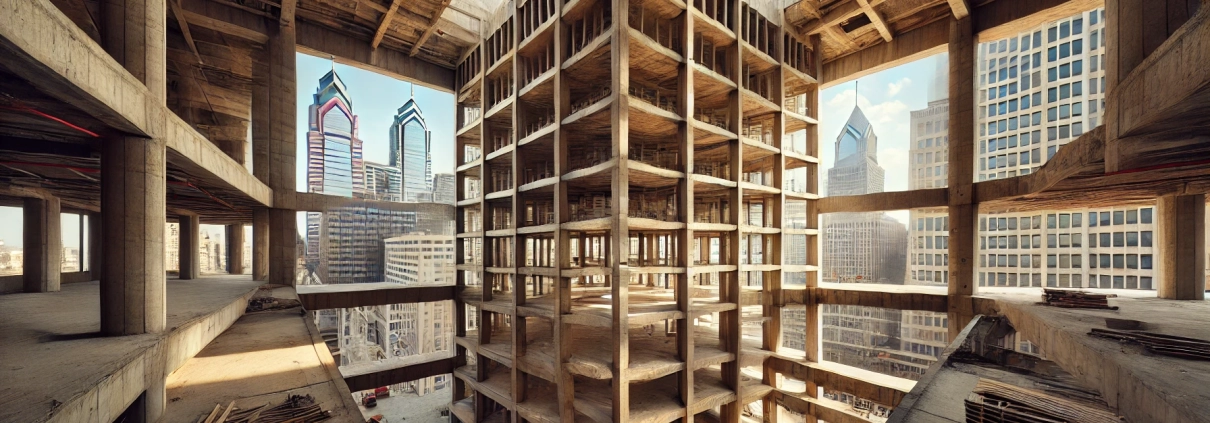Cold Shell
Any building/rentable area that consists only of a bare, unimproved shell i.e. no interior finishes, HVAC, plumbing, lighting, elevators etc.
Putting ‘Cold Shell’ in Context
Liberty Urban Development LLC, a seasoned real estate developer, recently acquired a high-rise office building known as Market Street Tower in the heart of Philadelphia. This 25-story building, originally constructed in the 1980s, had fallen into a state of disrepair over the years, with many of its previous tenants relocating to newer, more modern spaces. The building was vacant at the time of purchase, presenting a prime opportunity for a value-add redevelopment.
The Situation
When Liberty Urban Development took ownership of Market Street Tower, they found that the previous owner had stripped the interior down to what is known in the industry as a “cold shell.” Essentially, the building was reduced to its bare structural elements, with no interior finishes, HVAC systems, plumbing, lighting, or elevators. This state is typical for properties that are being prepared for significant redevelopment or for new tenants who prefer to customize their space entirely.
The Value-Add Strategy
The acquisition of Market Street Tower in its cold shell condition aligned perfectly with Liberty Urban Development’s value-add redevelopment strategy. The company planned to modernize the building to attract high-profile tenants, particularly tech firms and creative industries that value customizable and contemporary office environments.
Liberty Urban Development’s redevelopment plan included:
- Installation of New Building Systems: The first phase of the project involved installing new HVAC systems, plumbing, electrical wiring, elevators, and state-of-the-art building management systems to meet the expectations of modern office tenants.
- Customizable Tenant Spaces: Because the building was in a cold shell state, it allowed the developer to offer prospective tenants the ability to design and build out their office spaces according to their specific needs. This flexibility was a key selling point, particularly for tech firms that often require unique layouts and infrastructure.
- LEED Certification: The redevelopment also included plans to pursue LEED certification by incorporating energy-efficient systems, sustainable materials, and green building practices, further enhancing the building’s appeal in the competitive Philadelphia office market.
Financial Considerations
Given the cold shell condition of Market Street Tower, Liberty Urban Development was able to acquire the property at a relatively low cost of $40 million. The redevelopment was budgeted at an additional $30 million, which included all necessary building systems, interior finishes, and tenant improvements. The anticipated outcome was to reposition the property as a Class A office building with market-leading rents.
Liberty Urban Development projected that upon completion, the building would achieve an average rent of $40 per square foot, which is competitive for high-quality office space in Philadelphia. With 300,000 rentable square feet, the potential stabilized Net Operating Income (NOI) was estimated at $12 million annually, offering a strong return on the total investment of $70 million.
Conclusion
In this hypothetical scenario, the term “Cold Shell” is crucial for understanding the starting point of Liberty Urban Development’s value-add strategy for Market Street Tower. The cold shell condition provided the flexibility needed for a comprehensive redevelopment, allowing the developer to tailor the property to meet the demands of modern tenants. This approach not only maximized the building’s value but also positioned it as a top choice in the competitive Philadelphia office market.
Frequently Asked Questions about Cold Shell in Commercial Real Estate
What is a cold shell in commercial real estate?
A cold shell is “any building/rentable area that consists only of a bare, unimproved shell,” meaning it lacks interior finishes, HVAC, plumbing, lighting, elevators, and other essential systems.
Why would a building be left in a cold shell condition?
Buildings are often stripped to a cold shell “for significant redevelopment or for new tenants who prefer to customize their space entirely.”
How did Liberty Urban Development use the cold shell condition in its strategy?
The cold shell condition aligned with their value-add redevelopment strategy, allowing them to modernize the building and offer “customizable tenant spaces” to appeal to tech firms and creative industries.
What were the first redevelopment steps taken by Liberty Urban Development?
They began by installing “new HVAC systems, plumbing, electrical wiring, elevators, and state-of-the-art building management systems.”
How does a cold shell benefit potential tenants?
It offers tenants the ability “to design and build out their office spaces according to their specific needs,” making it attractive for those needing customized layouts.
What sustainability goals were included in the redevelopment plan?
The project included plans to pursue “LEED certification by incorporating energy-efficient systems, sustainable materials, and green building practices.”
What were the financial projections for the redeveloped cold shell property?
The acquisition cost was $40 million, with $30 million budgeted for redevelopment. Upon completion, the building was projected to generate $12 million in NOI annually from $40 per square foot rents across 300,000 rentable square feet.
Why is the term "cold shell" important in redevelopment projects?
It defines the starting physical condition of a property that allows for flexible, tailored redevelopment. In this case, it was “crucial for understanding the starting point of Liberty Urban Development’s value-add strategy.”
Click here to get this CRE Glossary in an eBook (PDF) format.

